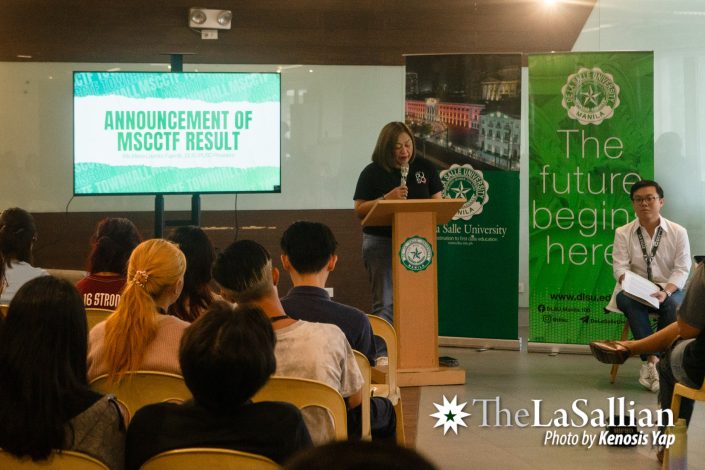The Multi-Sectoral Consultative Committee on Tuition Fees (MSCCTF) has settled for a five-percent tuition fee increase (TFI) after months-long discussions on each Lasallian sector’s needs and demands, as announced by the body’s chair and DLSU-PUSO President Maria Lourdes Fajardo in a town hall led by student, faculty, and parent representatives last March 13 at the USG Open Space on the third floor of the Br. Connon Hall.
Behind the rationale
Since December, the University Student Government (USG) and DLSU-PUSO have been jointly running a campaign for a zero-percent TFI through information gathering, information dissemination initiatives, and mobilizations in both the Manila and Laguna Campuses. The two bodies, on separate proposals, lobbied for a zero-percent TFI, arguing that DLSU is at a surplus and can implement its projects—mostly infrastructural—without implementing a TFI.
In contrast, the Association of Faculty and Educators of DLSU, Inc. (AFED) and Employees’ Association, who were the first to be heard by the MSCCTF, rallied under one proposal for a 9.21-percent TFI to make way for wage increases. By Republic Act No. 6728, or the Government Assistance to Students and Teachers in Private Education Act, 70 percent of an institution’s TFI should be allocated to these pay increases.
With sectoral demands and their own needs in mind, the administration proposed a six-percent hike, which was ultimately slashed to the current five-percent TFI after hours of deliberation on “internal and external factors affecting student life.”
Following these consultations, all that remains before the tuition fee is official are approvals from University President Br. Bernard Oca and the Commission on Higher Education.

Equally dismayed
With the approved TFI way off everyone’s proposals, all sectors expressed their concerns and hopes from the University administration.
“It is painful and disappointing knowing that our children’s education is compromised because of financial burden and uncertainty,” Fajardo lamented upon announcing the increase.
USG President Raphael Hari-Ong likewise expressed his disappointment that “calls for a zero-percent TFI were left unheard.”
AFED President David Michael San Juan acknowledged the concerns of students and other sectors of the university against TFI but also stressed that there is “no ideal or perfect situation” during TFI discussions and that their sector also has to deal with the country’s economic drawbacks.
“Binigay namin ang proposal na ‘yun para ipakita rin ang mga pangangailangan ng faculty…para…ma-claw back din ng faculty ‘yung hindi na-claw back sa nakaraang taon,” San Juan said.
(We gave that proposal to show the faculty’s needs so that faculty members can claw back from recent inflation rates over the past year.)
In terms of wage plans of faculty members, former AFED President Rommel Billena said that AFED will not be implementing an across-the-board (ATB) salary increase in accordance with the Faculty Manual 2021, which states that salary increases are based on the updated academic service faculty (ASF) ranks. Billena revealed that it would take about six years to standardize the salaries to allow an ATB increase.
Given the faculty’s “relatively competitive wages,” San Juan implored Lasallians to report their grievances against faculty members to proper channels and reassured that his communication lines would be open for concerns.
Remaining steadfast
Moving forward, the USG vowed to work on existing policies, such as easing surcharge fees, providing subsidies and needs-based financial aid to more student sectors, and implementing available digital payment methods to improve security in tuition fee payments by partnering with platforms, such as Maya and GCash.
“The USG is committed to amplifying scholarship programs for qualified needs-based students and financial grants, such as the Unified Scholarship Program, Dean’s Lister Grant, Achiever Scholarship Program, Lasallian Scholarship Program, and Extra Allowance Program,” USG Executive Treasurer Juliana Meneses enumerated.
Fajardo likewise expressed her commitment to aid students and parents in need through continuous support toward USG’s projects. She advised Lasallians to consult with the USG executive board or their respective college presidents for more support opportunities.
Hari-Ong highlighted that the USG will also work closely with Senior Vice President for Finance and Administration Dr. Rufo Mendoza for transparency initiatives on the allocation of tuition fees.
“Magkakaroon na tayo ng mga database. Pag-aaralan ng admin at USG kung ano ‘yung mga hiningi before at mga hindi pa nagagawa. From there, doon ililista ‘yung mga nagawa na o ‘yung mga kulang pa,” Hari-Ong remarks.
(We will have a database. The admin and USG will study what demands are yet to be met. From there, we will list down what is done and what needs to be fulfilled.)
With the final TFI rate, all eyes are now on the administration, who vowed developments over the next year. “Since a five percent increase will be applicable next school year, it is right and just to demand for improvements in our student life,” declared Meneses.
“Sana mapatupad din nila ‘yung mga sinasabi nila. Para, for our next MSCCTF meeting, ‘yan ang uunahin natin,” Fajardo echoed.
(I hope they fulfill what they say. So that, for our next meeting, that will be our first agenda.)
